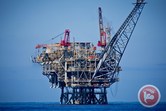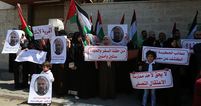8 nov 2018

Hundreds of Palestinians marched on Thursday in the funeral procession of Palestinian fishermen Mustafa Abu Odeh, who was killed by the Egyptian army off Rafah’s seashore, south of the blockaded Gaza Strip.
Political bureau chief of Hamas, Ismail Haneyya, who attended the funeral, said he has reached out to senior Egyptian intelligence officers to launch an immediate probe into the crime.
Egyptian military forces gunned down Abu Odeh off the coast of the southern Gaza Strip on Wednesday evening. He died from his injuries shortly after.
Political bureau chief of Hamas, Ismail Haneyya, who attended the funeral, said he has reached out to senior Egyptian intelligence officers to launch an immediate probe into the crime.
Egyptian military forces gunned down Abu Odeh off the coast of the southern Gaza Strip on Wednesday evening. He died from his injuries shortly after.

Head of Hamas’s political bureau Ismail Haneyya affirmed that he received a pledge from the Egyptian intelligence to investigate the killing of a Palestinian fisherman by the Egyptian navy on Wednesday.
“The killing of a Palestinian fisherman by Egyptian naval fire is shocking and unjustified because the issue of fishing was part of understandings with the Egyptian side,” Haneyya stated during the funeral of slain fisherman Mustafa Abu Odeh.
“I contacted the Egyptian intelligence to have information about what happened yesterday, and the agency promised to open an investigation into the incident and to punish the shooter,” the Hamas official said.
“The killing of a Palestinian fisherman by Egyptian naval fire is shocking and unjustified because the issue of fishing was part of understandings with the Egyptian side,” Haneyya stated during the funeral of slain fisherman Mustafa Abu Odeh.
“I contacted the Egyptian intelligence to have information about what happened yesterday, and the agency promised to open an investigation into the incident and to punish the shooter,” the Hamas official said.
7 nov 2018

Mustafa Abu Awda, 32
Egyptian military forces shot and killed a Palestinian fisherman off the coast of the southern Gaza Strip on Wednesday evening, the Ministry of Health in the besieged enclave said.
The Health Ministry said Mustafa Abu Awda, 32, was shot by Egyptian forces while at sea and died from his injuries.
It is unclear why Egyptian forces opened fire.
The incident comes as Palestinian fishermen already face daily risks in order to make a living, including routine harassment from Israeli naval forces, confiscation of boats and materials, detention, and potentially death.
Egyptian military forces shot and killed a Palestinian fisherman off the coast of the southern Gaza Strip on Wednesday evening, the Ministry of Health in the besieged enclave said.
The Health Ministry said Mustafa Abu Awda, 32, was shot by Egyptian forces while at sea and died from his injuries.
It is unclear why Egyptian forces opened fire.
The incident comes as Palestinian fishermen already face daily risks in order to make a living, including routine harassment from Israeli naval forces, confiscation of boats and materials, detention, and potentially death.
10 oct 2018

Egypt's naval forces at dawn Wednesday arrested two Palestinian fishermen off southern Gaza's shore.
Head of the Palestinian Fishermen Syndicate Nizar Ayyash told Quds Press that the Egyptian navy earlier in the day detained Sami and Ibrahim Edwan while they were fishing near the sea border between Gaza and Egypt and confiscated their boats.
Palestinian fishermen usually prefer to work near the Egyptian waters away from the attacks of Israeli gunboats.
Israel in 2006 imposed a land and sea blockade on the nearly two million Palestinians in the Gaza Strip. Fishermen are only allowed to sail within an area of 6 nautical miles.
Head of the Palestinian Fishermen Syndicate Nizar Ayyash told Quds Press that the Egyptian navy earlier in the day detained Sami and Ibrahim Edwan while they were fishing near the sea border between Gaza and Egypt and confiscated their boats.
Palestinian fishermen usually prefer to work near the Egyptian waters away from the attacks of Israeli gunboats.
Israel in 2006 imposed a land and sea blockade on the nearly two million Palestinians in the Gaza Strip. Fishermen are only allowed to sail within an area of 6 nautical miles.
28 sept 2018

In a provocative pro-Israel step, Israel’s Delek Drilling and the U.S. firm Noble Energy said Thursday they were acquiring, together with Egyptian East Gas Company, a 39% stake in the Egyptian company that owns a pipeline running between the Israeli-occupied territories and Egypt.
The two — partners in Israel’s Tamar and Leviathan gas fields — said they were paying $518 million for the stake in Eastern Mediterranean Gas and expect to complete the deal and related transactions by early next year.
“This is a historic transaction, that renders Egypt a regional energy center and positions it in line with significant global energy centers,” said Delek Drilling CEO Yossi Abu.
Shares of Delek Drilling, the Delek Group unit involved in the deal, rose 3.1% to 10.79 shekels ($2.99) on the Tel Aviv Stock Exchange. Nobel shares were up 1% at $31.41 midday local time in New York.
Buying an interest in the pipeline will enable the Tamar and Leviathan partners to deliver their gas to Egypt as they agreed under an agreement reached in February to supply 64 billion cubic meters of gas for $15 billion over 10 years.
The gas will initially come from Tamar, which is in production, and later from the much bigger Leviathan field, now in development. The buyer for the gas is Dolphinus, an Egyptian company that supplies gas to industrial and institutional users.
“Today’s announcements mark significant steps forward in supplying natural gas from the world-class Tamar and Leviathan fields to regional customers through existing infrastructure,” said J. Keith Elliott, Noble’s senior vice president for offshore operations.
Another beneficiary from the deal will be the bondholders of the Israeli company Ampal American, which was an EMG shareholder and went bankrupt when the pipeline was shut down. The stake in EMG changing hands comprises an 8.6% holding owned by Ampal.
Other sellers include Yossi Maiman, who had controlled Ampal and personally held another 8.2% of EMG; American billionaire Sam Zell (12.8%); Israeli institutional investors (8.2%) and Egyptian businessman Hussein Salem. The remainder of EMG’s shares will continue to be held by Hussein Salem’s company (28%) the Thai company PTT (25%) and the Egyptian government (about 10%).
According to Haaretz daily, had Thursday’s deal not been reached, there were two alternatives to using the EMG pipeline. One was to use the Jordanian pipeline, called the Pan-Arabian pipeline; the other was to build a new pipeline. But using EMG’s will enable the companies to begin exporting gas sooner.
The two — partners in Israel’s Tamar and Leviathan gas fields — said they were paying $518 million for the stake in Eastern Mediterranean Gas and expect to complete the deal and related transactions by early next year.
“This is a historic transaction, that renders Egypt a regional energy center and positions it in line with significant global energy centers,” said Delek Drilling CEO Yossi Abu.
Shares of Delek Drilling, the Delek Group unit involved in the deal, rose 3.1% to 10.79 shekels ($2.99) on the Tel Aviv Stock Exchange. Nobel shares were up 1% at $31.41 midday local time in New York.
Buying an interest in the pipeline will enable the Tamar and Leviathan partners to deliver their gas to Egypt as they agreed under an agreement reached in February to supply 64 billion cubic meters of gas for $15 billion over 10 years.
The gas will initially come from Tamar, which is in production, and later from the much bigger Leviathan field, now in development. The buyer for the gas is Dolphinus, an Egyptian company that supplies gas to industrial and institutional users.
“Today’s announcements mark significant steps forward in supplying natural gas from the world-class Tamar and Leviathan fields to regional customers through existing infrastructure,” said J. Keith Elliott, Noble’s senior vice president for offshore operations.
Another beneficiary from the deal will be the bondholders of the Israeli company Ampal American, which was an EMG shareholder and went bankrupt when the pipeline was shut down. The stake in EMG changing hands comprises an 8.6% holding owned by Ampal.
Other sellers include Yossi Maiman, who had controlled Ampal and personally held another 8.2% of EMG; American billionaire Sam Zell (12.8%); Israeli institutional investors (8.2%) and Egyptian businessman Hussein Salem. The remainder of EMG’s shares will continue to be held by Hussein Salem’s company (28%) the Thai company PTT (25%) and the Egyptian government (about 10%).
According to Haaretz daily, had Thursday’s deal not been reached, there were two alternatives to using the EMG pipeline. One was to use the Jordanian pipeline, called the Pan-Arabian pipeline; the other was to build a new pipeline. But using EMG’s will enable the companies to begin exporting gas sooner.
7 aug 2018

The Egyptian General Petroleum Corporation confirmed that a private Egyptian company plans to start importing gas from Israel for re-export during the first quarter of 2019.
The plans to import gas from Israel comes after agreements signed in February 2018 to buy $15 billion worth of gas over the next decade.
The private Egyptian company, Dolphinus Holdings, said that "Imports will start in small quantities first and will gradually increase to reach their climax in September 2019."
No specific prices or quantities were released.
Partners in Israel's Tamar and Leviathan offshore gas fields, which include Delek Group, Isramco and Ratio, agreed with Dolphinus Holdings to provide a total of 64 billion cubic meters of gas over the next ten years.
Half of the supply will come from each field and the proceeds will also be split equally in half.
The start date of exports was not yet set.
The Israeli Minister of Energy, Yuval Steinitz, said that the agreement between Dolphinus Holdings and Israel was Egypt’s most important export deal since the two countries signed the peace treaty in Washington in 1979.
The plans to import gas from Israel comes after agreements signed in February 2018 to buy $15 billion worth of gas over the next decade.
The private Egyptian company, Dolphinus Holdings, said that "Imports will start in small quantities first and will gradually increase to reach their climax in September 2019."
No specific prices or quantities were released.
Partners in Israel's Tamar and Leviathan offshore gas fields, which include Delek Group, Isramco and Ratio, agreed with Dolphinus Holdings to provide a total of 64 billion cubic meters of gas over the next ten years.
Half of the supply will come from each field and the proceeds will also be split equally in half.
The start date of exports was not yet set.
The Israeli Minister of Energy, Yuval Steinitz, said that the agreement between Dolphinus Holdings and Israel was Egypt’s most important export deal since the two countries signed the peace treaty in Washington in 1979.
22 apr 2018

Dozens of Palestinians along with the families of a number of youths who were missing during their travel from Gaza Strip through Rafah crossing staged a sit-in before the headquarters of International Committee of Red Cross in Gaza. They demanded that Egyptian authorities acquaint them on the fate of their sons.
Adnan Abu Watfa, representative of the family of the missing Husam Abu Watfa, told the PIC that the family asked the Egyptian authorities and Egypt's President Abdul Fattah al-Sisi to help unveil the fate of their son who was going to Qatar to visit his sick parents when he was missed.
The family said that they contacted the Palestinian Embassy and the competent authorities, which has led to no positive response in this regard.
For his part, Mahoud Abu Mehliha, told the PIC that they lost contact with his brother, Ayman, after he had reached Cairo International Airport, heading to Rafah crossing, on August 16, 2017 after finishing his PhD study.
Adnan Abu Watfa, representative of the family of the missing Husam Abu Watfa, told the PIC that the family asked the Egyptian authorities and Egypt's President Abdul Fattah al-Sisi to help unveil the fate of their son who was going to Qatar to visit his sick parents when he was missed.
The family said that they contacted the Palestinian Embassy and the competent authorities, which has led to no positive response in this regard.
For his part, Mahoud Abu Mehliha, told the PIC that they lost contact with his brother, Ayman, after he had reached Cairo International Airport, heading to Rafah crossing, on August 16, 2017 after finishing his PhD study.
1 mar 2018

A Palestinian man was injured on Thursday morning after an Egyptian shell hit a Palestinian house in Rafah city in the southern Gaza Strip.
Palestinian security sources told Quds Press that a mortar shell hit an abandoned house in Rafah city.
A bystander man was lightly injured during the incident, the sources added.
Explosions are heard on a near-constant basis in Rafah city as Egyptian army launched a military campaign against armed groups in the Sinai Peninsula.
Palestinian security sources told Quds Press that a mortar shell hit an abandoned house in Rafah city.
A bystander man was lightly injured during the incident, the sources added.
Explosions are heard on a near-constant basis in Rafah city as Egyptian army launched a military campaign against armed groups in the Sinai Peninsula.
20 feb 2018

Israeli gas fields in the Mediterranean will soon be providing gas exports to Egypt as a part of a 10-year, $15 billion deal announced on Monday.
According to the PNN, Israeli gas excavation companies Delek Drilling and Noble Energy will export roughly seven-billion cubic-meters of gas annually from drilling platforms in the Mediterranean, namely the Leviathan and Tamar gas fields, to Egyptian Company Dolphin Energy for the duration of the deal.
In a public statement posted online, Israeli Prime Minister Benjamin Netanyahu praised the deal, adding that it would strengthen ‘security, economy, and regional relationships.’
Some have criticized the deal as being merely symbolic. As of yet, there are no plans for means of exportation of the gas to Egypt.
As reported by the Jerusalem post, the most obvious means, the East Mediterranean Gas line, which runs parallel with the Gaza Strip, was declared insolvent by its parent company, EGS.
‘There’s not even a route determined, so it’s hard to sign a binding agreement,” said Brenda Shaffer, an American-Israeli professor at Georgetown University in Washington in an interview with the Jerusalem Post.
Alternative routes through Jordan would require subsequent negotiations with Jordanian officials before the flow of oil could proceed.
The announcement comes amid warming relations between Israel and Egypt.
Earlier this month, an investigation conducted by the New York Times revealed an extensive campaign of airstrikes conducted by the Israeli military in the Sinai Peninsula.
Egyptian armed forces have struggled in recent years to contain the violent insurgency that erupted in the region in 2013 when groups with ties to the Islamic State group emerged. They have since carried out a series of deadly attacks against minority ethnic groups in the peninsula, including Coptic Christians and Sufi adherents, as well as against the Egyptian armed forces.
The Egyptian armed forces have struggled to contain armed groups within the peninsula which remains mostly tribal and comprised of mostly Bedouin communities.
The investigation by the New York Times revealed that security cooperation by Israel and Egypt had exceeded that which was previously made public. Rather, Israel had carried out a number of airstrikes in the region and had taken measures to disguise the fact that the attacks were originating from Israel and not Egypt, principally by adjusting flight paths so as to appear to be coming from Egypt.
The two oil fields in question pose additional challenges to the deal.
The Tamar field is nearing exhaustion and the Levitation field is yet to be operational, with platforms still under construction and expected not to be operational till 2019.
Exportation from the Leviathan field to Egypt would accompany an existing deal made with Jordan in 2016 to supply Jordan with gas from the Leviathan field for a period of 15 years. The deal made with Jordanian National Electric Power Company was worth $10 billion.
04/13/17 How Israel Uses Gas to Enforce Palestinian Dependency and Promote Normalization
According to the PNN, Israeli gas excavation companies Delek Drilling and Noble Energy will export roughly seven-billion cubic-meters of gas annually from drilling platforms in the Mediterranean, namely the Leviathan and Tamar gas fields, to Egyptian Company Dolphin Energy for the duration of the deal.
In a public statement posted online, Israeli Prime Minister Benjamin Netanyahu praised the deal, adding that it would strengthen ‘security, economy, and regional relationships.’
Some have criticized the deal as being merely symbolic. As of yet, there are no plans for means of exportation of the gas to Egypt.
As reported by the Jerusalem post, the most obvious means, the East Mediterranean Gas line, which runs parallel with the Gaza Strip, was declared insolvent by its parent company, EGS.
‘There’s not even a route determined, so it’s hard to sign a binding agreement,” said Brenda Shaffer, an American-Israeli professor at Georgetown University in Washington in an interview with the Jerusalem Post.
Alternative routes through Jordan would require subsequent negotiations with Jordanian officials before the flow of oil could proceed.
The announcement comes amid warming relations between Israel and Egypt.
Earlier this month, an investigation conducted by the New York Times revealed an extensive campaign of airstrikes conducted by the Israeli military in the Sinai Peninsula.
Egyptian armed forces have struggled in recent years to contain the violent insurgency that erupted in the region in 2013 when groups with ties to the Islamic State group emerged. They have since carried out a series of deadly attacks against minority ethnic groups in the peninsula, including Coptic Christians and Sufi adherents, as well as against the Egyptian armed forces.
The Egyptian armed forces have struggled to contain armed groups within the peninsula which remains mostly tribal and comprised of mostly Bedouin communities.
The investigation by the New York Times revealed that security cooperation by Israel and Egypt had exceeded that which was previously made public. Rather, Israel had carried out a number of airstrikes in the region and had taken measures to disguise the fact that the attacks were originating from Israel and not Egypt, principally by adjusting flight paths so as to appear to be coming from Egypt.
The two oil fields in question pose additional challenges to the deal.
The Tamar field is nearing exhaustion and the Levitation field is yet to be operational, with platforms still under construction and expected not to be operational till 2019.
Exportation from the Leviathan field to Egypt would accompany an existing deal made with Jordan in 2016 to supply Jordan with gas from the Leviathan field for a period of 15 years. The deal made with Jordanian National Electric Power Company was worth $10 billion.
04/13/17 How Israel Uses Gas to Enforce Palestinian Dependency and Promote Normalization
16 feb 2018

Informed sources revealed that Egyptian intelligence director Abbas Kamel affirmed, during his recent meeting with the delegation of Hamas in Cairo, that his country would work on improving the humanitarian situation in the impoverished Gaza Strip.
According to those sources, Egypt will embark on cooperating with the UN and donor countries to put an end to the current deterioration of the humanitarian conditions in Gaza.
Egypt will also take concrete steps regarding the mechanisms used to open the Rafah border crossing with Gaza and the movement of goods, and will allow Egyptian companies to work in Gaza and carry out development projects.
During the meeting with the delegation of Hamas, Egypt’s intelligence chief expressed willingness to send a delegation of security officials to Gaza soon to follow up the Palestinian reconciliation process and the progress that had been made in this regard.
The two sides also confirmed their positions on rejecting any move seeking to expand Gaza at the expense of Egypt’s sovereignty over its territory in Sinai, stressing that such step would never be in “the political dictionary of Egypt or Hamas.”
The meeting between the two sides took place last Tuesday, and they discussed several issues of mutual interest, especially the Palestinian reconciliation, Gaza humanitarian crises, the Rafah border crossing and the mutual relations.
A high-level delegation from Hamas led by Haneyya left last Friday for Cairo through the Rafah crossing following prior arrangements with the Egyptian side.
According to those sources, Egypt will embark on cooperating with the UN and donor countries to put an end to the current deterioration of the humanitarian conditions in Gaza.
Egypt will also take concrete steps regarding the mechanisms used to open the Rafah border crossing with Gaza and the movement of goods, and will allow Egyptian companies to work in Gaza and carry out development projects.
During the meeting with the delegation of Hamas, Egypt’s intelligence chief expressed willingness to send a delegation of security officials to Gaza soon to follow up the Palestinian reconciliation process and the progress that had been made in this regard.
The two sides also confirmed their positions on rejecting any move seeking to expand Gaza at the expense of Egypt’s sovereignty over its territory in Sinai, stressing that such step would never be in “the political dictionary of Egypt or Hamas.”
The meeting between the two sides took place last Tuesday, and they discussed several issues of mutual interest, especially the Palestinian reconciliation, Gaza humanitarian crises, the Rafah border crossing and the mutual relations.
A high-level delegation from Hamas led by Haneyya left last Friday for Cairo through the Rafah crossing following prior arrangements with the Egyptian side.
13 jan 2018

Abdullah Zaidan 33
A Palestinian fisherman was proclaimed dead on Saturday morning after he succumbed to wounds he sustained when Egyptian soldiers opened fire at him the other day off the southern coast of the besieged Gaza Strip.
A spokesman for the health ministry said that 33-year-old Abdullah Zaidan suffered serious bullet injuries on Friday evening after being shot during his presence on his boat off the shore of Rafah area, south of Gaza.
News reports said on Friday that the fisherman, Zaidan, suffered injuries when Egyptian naval forces opened fire him as he was fishing in Gaza waters.
A Palestinian fisherman was proclaimed dead on Saturday morning after he succumbed to wounds he sustained when Egyptian soldiers opened fire at him the other day off the southern coast of the besieged Gaza Strip.
A spokesman for the health ministry said that 33-year-old Abdullah Zaidan suffered serious bullet injuries on Friday evening after being shot during his presence on his boat off the shore of Rafah area, south of Gaza.
News reports said on Friday that the fisherman, Zaidan, suffered injuries when Egyptian naval forces opened fire him as he was fishing in Gaza waters.
Page: 2 - 1
